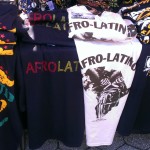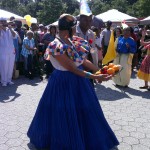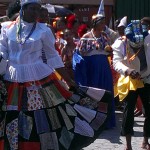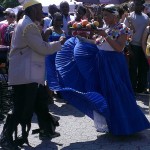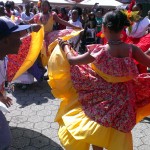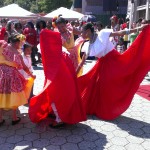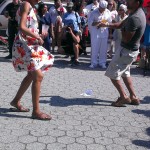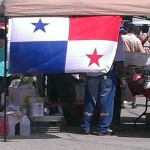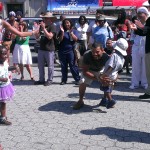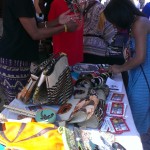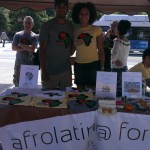
On Saturday, June 29, 2013, the first Afro Latino Festival of New York: Listen to the Echo of the Drums in Latin America was held in Flatbush, Brooklyn, home to one of the largest Caribbean and Afro Latino communities in New York City. This cultural community event, produced by Tania Molina & Mai-Elka Prado Gil, in conjunction with Brooklyn’s Arts and Culture Festival, was setup on a large, busy street corner with a sizable crowd enjoying the festivities.
The festival’s main cultural expressions were in the form of performances, food, arts and crafts. A major attraction was the traditional folk music accompanied by African dance, performed by children and adults dressed in colorful customary dress. These traditional songs were sung in African dialects and the choreography complimented the backdrop of complex drumming in order to honor and connect with ancestors. The live salsa bands were also a big hit and there was lots of dancing during the shows. There were also vendors selling a variety of Latino foods from the Caribbean and Latin America, hand crafted jewelry, t-shirts and original works of media highlighting Afro Latino history, including The Afro-Latin@ Reader: History and Culture in the United States.
The platform that the festival created brought visibility to Latin cultures within the African Diaspora, as well as to the issues that those groups experience within the United States, the Caribbean and Latin America. To make that happen, Tania and Mai-Elka partnered with cultural, social justice and media nonprofit organizations that actively support Afro Latinos, and believe in the producers’ mission — to create an artistic space for Afro Latinos to be represented and celebrated. Mai-Elka shared, “It was easy to create the festival because of the need for it. People are thirsty for this and we provided the water that everyone drank.” Additional supporters that helped in addressing this need include the Afro Latino@ Project, Haitian Cultural Exchange, Palenque Afro Latino Magazine, Mundoloco Producciones and Afro Latin@ Forum.
Another goal of the Afro Latino Festival of New York is to preserve a major part of the rich culture that is gradually becoming overshadowed by the gentrification within Flatbush and the neighboring Crown Heights community. “We need a space for us to be united. Sometimes we need to make it clear that we’re here, fully present and that we’re doing something for the community,” Mai-Elka explained. “We are challenging gentrification by showing that we are strong, hardworking professionals who are Black, Latino, and Black and Latino; they are often not mutually exclusive. The presence that we have will get bigger and stronger.” In support of the event and of the Afro Latino community, New York City’s mayoral candidate, Bill Thompson, joined the festivities and spoke with attendees.
With a successful inaugural Afro Latino Festival of New York, the stage is set for future celebrations that continue to strengthen, unite and give voice to people of African descent.
This post was written by Natalie Diaz, a contributor to The Burton Wire. Follow her on Twitter @supanat.
Like The Burton Wire on Facebook. Follow us on Twitter @TheBurtonWire.


